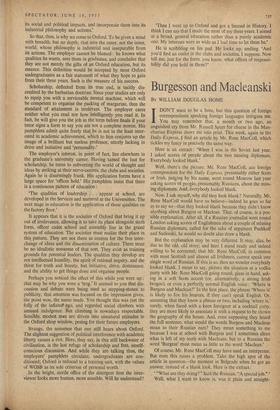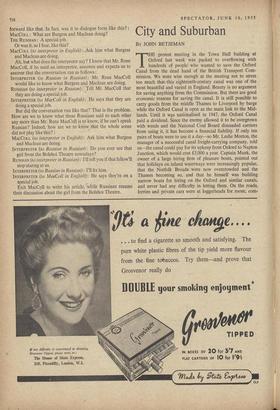Burgesson and Macleanski
BY WILLIAM DOUGLAS HOME IDON'T want to be a bore, but this question of foreign correspondents speaking foreign languages intrigues me. You may remember that, a month or two ago, an anguished cry from Mr. Russell Spurr for cheese in the Man- churian Express drove me into print. This week, again in the Daily Express, I find an article by Mr. Rene MacColl, which tickles my fancy in precisely the same way.
Here is an extract: 'When I was in the Soviet last year, I asked scores of people about the two missing diplomats. Everybody looked blank.'
Well, there's the picture. Mr. Rene MacColl, ace foreign correspondent for the Daily Express, presumably either Scots or Irish, judging by his name, went round Moscow last year asking scores of people, presumably Russians, about the miss- ing diplomats. And, everybody looked blank.
Now, I ask myself, why did they look blank? Naturally, Mr. Rene MacColl would have us believe—indeed he goes so far as to say so—that they looked blank because they didn't know anything about Burgess or Maclean. That, of course, is a pos- sible explanation. After all, if a Russian journalist went round. London asking scores of Englishmen about a couple of missing Russian diplomats, called for the sake of argument Pushkoff and Sudenski, he would no doubt also draw a blank.
But the explanation may be very different. It may. alas, be due to the old. old story; and here I stand ready and indeed willing to be corrected; that Mr. Rene MacColl, in common with most Scottish and almost all Irishmen, cannot speak one single word of Russian. If this is so, then no wonder everybody looked blank. I mean to say, picture the situation at a vodka party with Mr. Rene MacColl going round, glass in hand, ask- ing in a soft Scots accent (or, alternatively, a strong Irish brogue), or even a perfectly normal English voice: 'Where is Burgess and Maclean'?' In the first place, the phrase 'Where is' is likely to fox his hearers, if they can't speak English. Or. assuming that they know a phrase or two, including 'where is,' surely, when faced with a keen foreigner at a cocktail party, they are more likely to associate it with a request to be shown the geography of the house. And, even supposing they heard the full sentence, what would the words Burgess and Maclean mean to their Russian ears? They mean something to me because I was at school with Burgess and I sometimes clean what is left of my teeth with Macleans, but to a Russian the word 'Burgess' must mean as little as the word 'Maclean.' forward like that. In fact, was it in dialogue form like this? : MAcCon : What are Burgess and Maclean doing?
THE RUSSIAN: A special job.
Or was it, as I fear, like this?
MacCon (to interpreter in English):. Ask him what Burgess and Maclean are doing.
Ah, but what does the interpreter say? I know that Mr. Rene MacColl, if he used an interpreter, assumes and expects.us to assume that the conversation ran as follows : INTERPRETER (to Russian in Russian): Mr. Rene MacColl would like to know what Burgess and Maclean are doing. RUSSIAN (to interpreter in Russian): Tell Mr. MacColl that they are doing a special job.
INTERPRETER (to MacColl in English): He says that they are doing a special job.
But did the conversation run like that? That is the problem. How are we to know what these Russians said to each other any more than Mr. Rene MacColl is to know, if he can't speak Russian? Indeed, how are we to know that the whole scene did not play like this? : MAcCou., (to interpreter in English): Ask him what Burgess and Maclean are doing.
INTERPRETER (to Russian in Russian): Do you ever sec that girl from the Bolshoi Theatre nowadays?
RUSSIAN (to interpreter in Russian): I'll tell you if that fellow'll stop staring at us.
INTERPRETER (to Russian in Russian): I'll fix hill).
INTERPRETER (to Mat:Coll in English): He says they're on a special job. - Exit MacColl to write his article, while Russians resume their discussion about the girl from the Bolshoi Theatre,











































 Previous page
Previous page